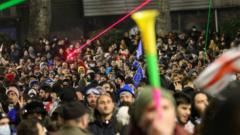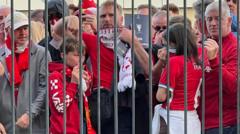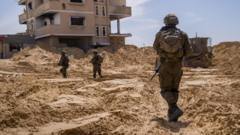In a wave of civil unrest, Georgian citizens have taken to the streets of Tbilisi for the third consecutive night, protesting the government's decision to suspend negotiations for European Union (EU) membership. The demonstrations have drawn significant police attention, with riot units employing water cannons and tear gas to manage the crowds concentrated around the parliament building.
Georgians Protest as EU Talks Stalled Amid Growing Tensions

Georgians Protest as EU Talks Stalled Amid Growing Tensions
Tbilisi's streets erupt in protest as citizens express discontent over halted EU accession negotiations while the government braces for backlash.
The protests, which have also spread to various cities including Batumi, Kutaisi, and Zugdidi, come in the wake of President Salome Zourabichvili's statement to the BBC, asserting her commitment to remain in office until new parliamentary elections are conducted. Zourabichvili, claiming the current parliament lacks legitimacy, expressed concerns over alleged election fraud that marred last month’s elections. As a result, several civil servants and Georgian ambassadors to multiple European nations have resigned in protest, reflecting a growing discontent with the government's decision regarding EU talks.
The ruling party, Georgian Dream, has faced increasing scrutiny since the elections, with opposition factions alleging vote rigging and boycotting the newly elected parliament. In a supporting resolution, the European Parliament labeled the election as part of a "worsening democratic crisis" in Georgia, emphasizing that the ruling party bears full responsibility for the situation.
On Thursday, Prime Minister Irakli Kobakhidze announced that EU accession discussions would remain off the table until at least 2028, prompting further outrage. A group of prominent public figures and journalists have accused the state broadcaster of serving as a propaganda tool for the government, calling for its independence from political influence.
The opposition coalition, which won seats in parliament yet opted not to accept their mandates, is demanding new elections under international oversight, stating, “Parties with a legitimate mandate of the Georgian people will confront the illegitimate regime of Georgian Dream and the systemic violence against peaceful demonstrators and journalists.”
International observers, including the US State Department, have condemned the heavy-handed police response to protests, urging all parties involved to maintain peace. Following intense confrontations, approximately 150 protesters were arrested, with reports of police injuries stemming from violent clashes. Prime Minister Kobakhidze has countered the narrative by asserting that law enforcement is merely responding to aggressive actions from demonstrators but remains critical of Western political figures for perceived insults directed at the Georgian government.
The ruling party, Georgian Dream, has faced increasing scrutiny since the elections, with opposition factions alleging vote rigging and boycotting the newly elected parliament. In a supporting resolution, the European Parliament labeled the election as part of a "worsening democratic crisis" in Georgia, emphasizing that the ruling party bears full responsibility for the situation.
On Thursday, Prime Minister Irakli Kobakhidze announced that EU accession discussions would remain off the table until at least 2028, prompting further outrage. A group of prominent public figures and journalists have accused the state broadcaster of serving as a propaganda tool for the government, calling for its independence from political influence.
The opposition coalition, which won seats in parliament yet opted not to accept their mandates, is demanding new elections under international oversight, stating, “Parties with a legitimate mandate of the Georgian people will confront the illegitimate regime of Georgian Dream and the systemic violence against peaceful demonstrators and journalists.”
International observers, including the US State Department, have condemned the heavy-handed police response to protests, urging all parties involved to maintain peace. Following intense confrontations, approximately 150 protesters were arrested, with reports of police injuries stemming from violent clashes. Prime Minister Kobakhidze has countered the narrative by asserting that law enforcement is merely responding to aggressive actions from demonstrators but remains critical of Western political figures for perceived insults directed at the Georgian government.



















